六年级下册英语Recycle Day 4 Mike’s day on the farm The fourth period 课件(共32张PPT)
文档属性
| 名称 | 六年级下册英语Recycle Day 4 Mike’s day on the farm The fourth period 课件(共32张PPT) |
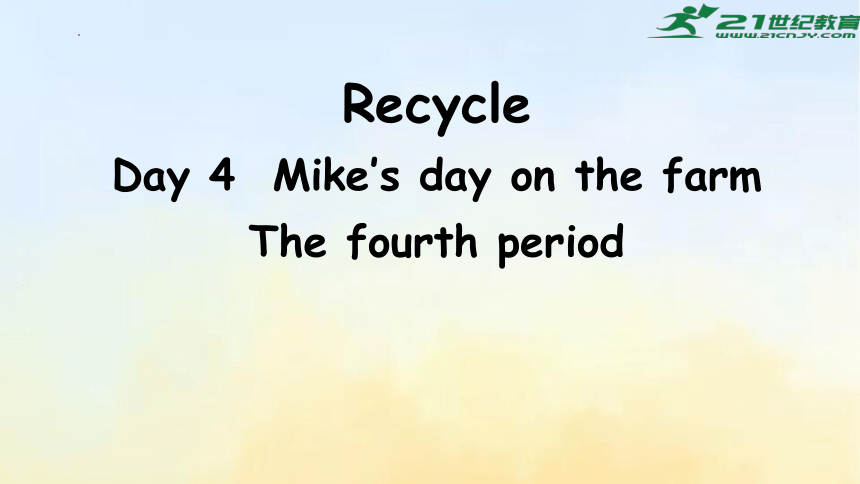
|
|
| 格式 | pptx | ||
| 文件大小 | 15.0MB | ||
| 资源类型 | 试卷 | ||
| 版本资源 | 人教版(PEP) | ||
| 科目 | 英语 | ||
| 更新时间 | 2023-02-28 00:00:00 | ||
图片预览

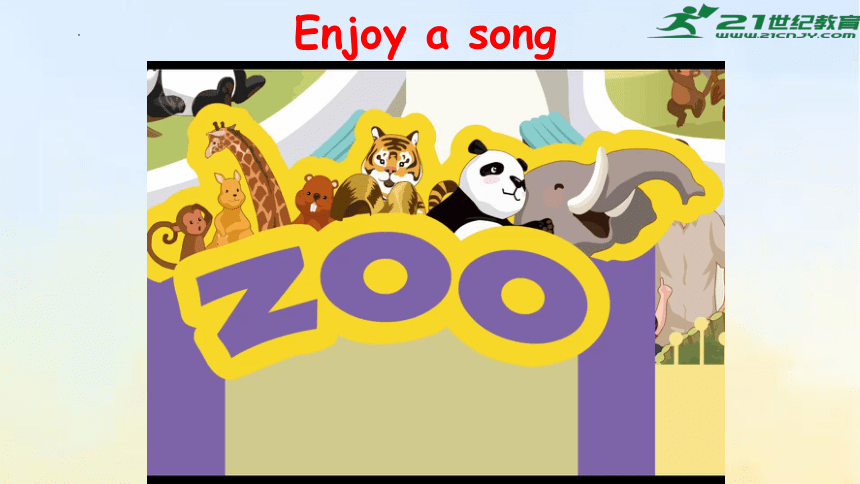

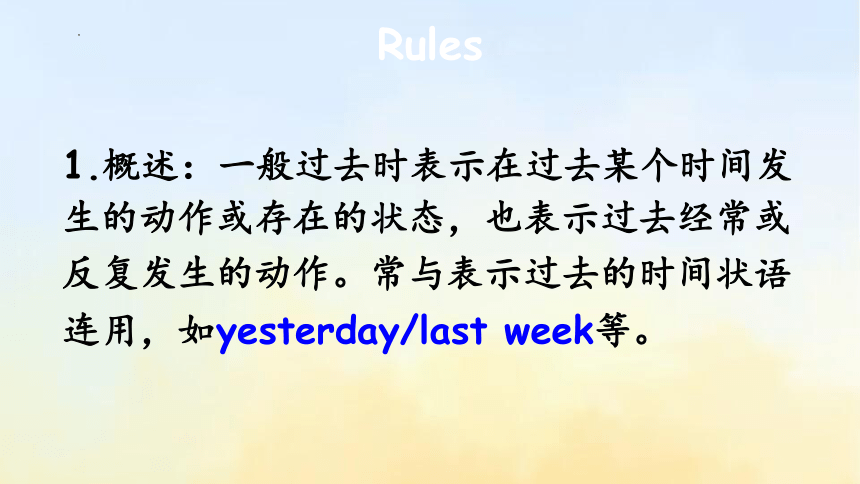

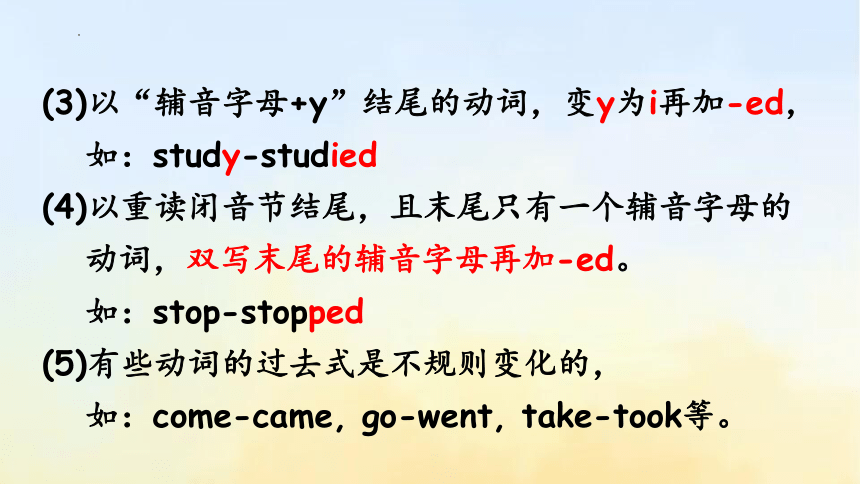
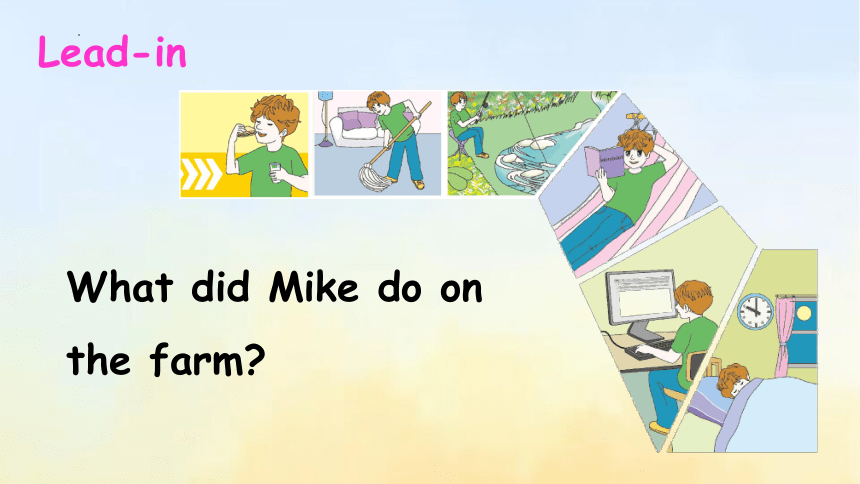

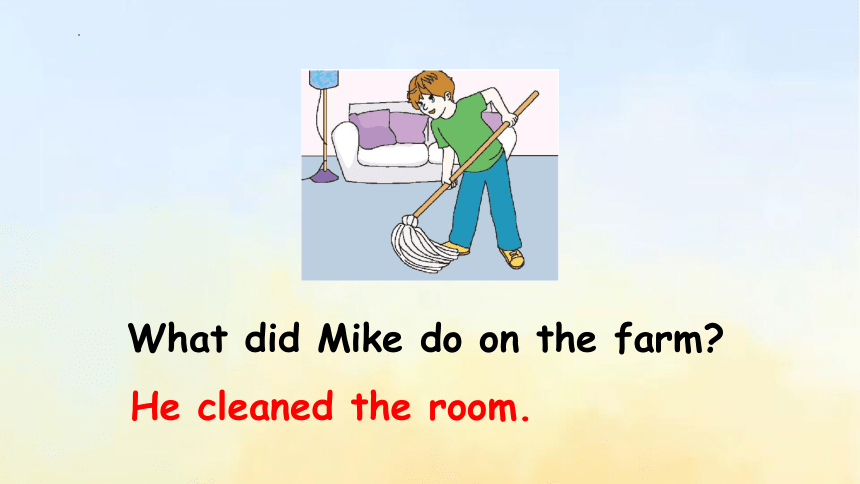
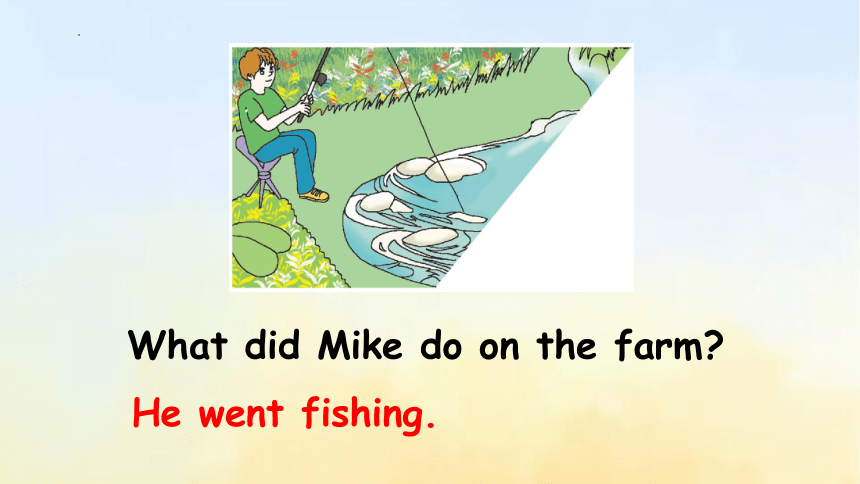
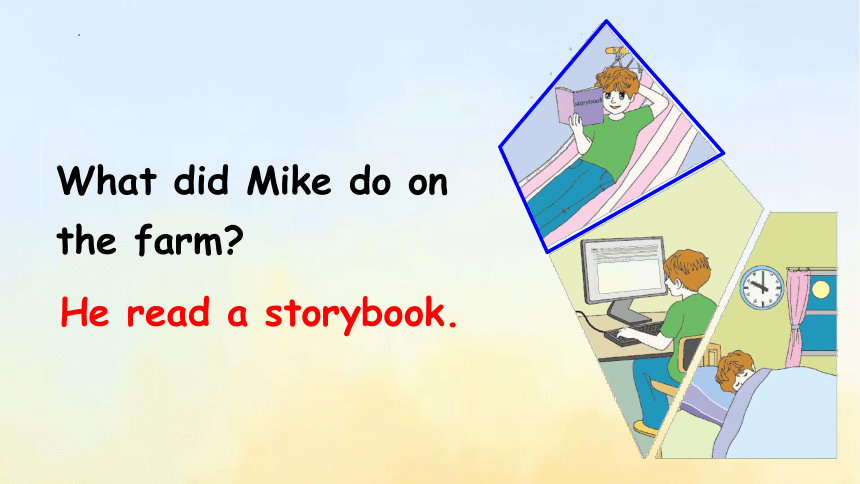

文档简介
(共32张PPT)
Recycle
Day 4 Mike’s day on the farm
The fourth period
Enjoy a song
Rap together
clean the room cleaned the room
eat breakfast ate breakfast
go fishing went fishing
I say
you say
Rules
1.概述:一般过去时表示在过去某个时间发生的动作或存在的状态,也表示过去经常或反复发生的动作。常与表示过去的时间状语连用,如yesterday/last week等。
2.动词过去式的变化规律:
(1)一般情况下直接在词尾加-ed,如:
play-played
(2)以不发音的字母e结尾的动词,加-d,
如:live-lived
(3)以“辅音字母+y”结尾的动词,变y为i再加-ed,
如:study-studied
(4)以重读闭音节结尾,且末尾只有一个辅音字母的动词,双写末尾的辅音字母再加-ed。
如:stop-stopped
(5)有些动词的过去式是不规则变化的,
如:come-came, go-went, take-took等。
What did Mike do on the farm
Lead-in
What did Mike do on the farm
He had/ate breakfast.
Ask and answer
What did Mike do on the farm
He cleaned the room.
What did Mike do on the farm
He went fishing.
What did Mike do on the farm
He read a storybook.
He used a computer./
He wrote an e-mail./
He played computer games.
What did Mike do on the farm
He went to bed at 10:00 p.m./
He slept at 10:00 p.m.
What did Mike do on the farm
Saturday was a busy day for me.
In the morning, I got up early.
Then I _______________.
After that, I _______________.
Next, I _________________.
had breakfast
cleaned my room
went fishing
Finish Mike’s diary.
In the afternoon, I __________________.
In the evening, I ___________________.
Finally, I __________ at 10 p.m.
read a storybook
played computer games
went to bed
Retell Mike’s day on the farm.
Change “I” into “he”.
Change “me” into “him”.
Saturday was a busy day for him.
In the morning, he got up early.
Then he _______________.
After that, he _______________.
Next, he _________________.
had breakfast
cleaned his room
went fishing
In the afternoon, he __________________.
In the evening, he __________________.
Finally, he __________ at 10 p.m.
read a storybook
played computer games
went to bed
Mike and Bill are playing a game. Let’s listen.
Listen carefully and circle the adjectives in all forms in the textbook.
1.Show one picture.
Bill: It’s an elephant. It’s big.
2. Get another picture, but don’t turn it over.
Bill: Guess! Is this bigger or smaller than the elephant
Mike: I think it’s bigger than the elephant.
Bill: No, it isn’t. It’s smaller. Look. It’s a tiger.
3. Show the last picture.
Bill: Look. The other card is a whale.
Mike: So the whale is the biggest, and the tiger is
the smallest.
There are three pictures.
Look and describe.
—What’s this
—It’s an elephant.
It’s big.
—What’s this
—It’s a tiger.
—Is the tiger bigger than the elephant
—No, it isn’t. It’s smaller.
—What’s this
—It’s a whale.
—The whale is bigger than the elephant.
It’s the biggest.
The tiger is the smallest.
There are three pictures.
Read the game together and learn to play the game.
1.Show one picture.
Bill: It’s an elephant.
It’s big.
2. Get another picture, but don’t turn it over.
Bill: Guess! Is this bigger
or smaller than the
elephant
Mike: I think it’s bigger
than the elephant.
Bill: No, it isn’t. It’s
smaller. Look. It’s a tiger.
3. Show the last picture.
Bill: Look. The other card
is a whale.
Mike: So the whale is the
biggest, and the tiger
is the smallest.
Discuss in groups
How to play this game
What sentences structures, what kind of words or phrases do they need
1.形容词比较级的句型:
A+be动词+形容词比较级+than+B.
用于两者间进行比较,表示“A比B……”。
例如:他比我高。
He is taller than me.
这个包比那个大。
This bag is bigger than that one.
Rules
形容词或副词比较级的变化规则口诀:
原级变成比较级,er结尾要牢记;
一般情况直接加,单辅重闭双写加;
辅音加y,把y改为i再加,以e结尾去e加;
少数部分双音节,规则如同单音节。
其余双音多音节,词前加more就可以,
不规则词没几个,它们需要特殊记。
2.形容词最高级的句型:
人/物+be动词+the+形容词最高级+名词+表示
范围的短语或从句。
用于两个以上的人或物进行比较。
例如:她是她班上个子最高的学生。
She is the tallest student in her class.
这是这幅图里最大的球。
This is the biggest ball in the picture.
形容词最高级的变化规则与比较级相似,区别是比较级以-er结尾,最高级以-est结尾并在前面加the。
注意:双音节和多音节形容词的最高级需在前面加most来构成。
Recycle
Day 4 Mike’s day on the farm
The fourth period
Enjoy a song
Rap together
clean the room cleaned the room
eat breakfast ate breakfast
go fishing went fishing
I say
you say
Rules
1.概述:一般过去时表示在过去某个时间发生的动作或存在的状态,也表示过去经常或反复发生的动作。常与表示过去的时间状语连用,如yesterday/last week等。
2.动词过去式的变化规律:
(1)一般情况下直接在词尾加-ed,如:
play-played
(2)以不发音的字母e结尾的动词,加-d,
如:live-lived
(3)以“辅音字母+y”结尾的动词,变y为i再加-ed,
如:study-studied
(4)以重读闭音节结尾,且末尾只有一个辅音字母的动词,双写末尾的辅音字母再加-ed。
如:stop-stopped
(5)有些动词的过去式是不规则变化的,
如:come-came, go-went, take-took等。
What did Mike do on the farm
Lead-in
What did Mike do on the farm
He had/ate breakfast.
Ask and answer
What did Mike do on the farm
He cleaned the room.
What did Mike do on the farm
He went fishing.
What did Mike do on the farm
He read a storybook.
He used a computer./
He wrote an e-mail./
He played computer games.
What did Mike do on the farm
He went to bed at 10:00 p.m./
He slept at 10:00 p.m.
What did Mike do on the farm
Saturday was a busy day for me.
In the morning, I got up early.
Then I _______________.
After that, I _______________.
Next, I _________________.
had breakfast
cleaned my room
went fishing
Finish Mike’s diary.
In the afternoon, I __________________.
In the evening, I ___________________.
Finally, I __________ at 10 p.m.
read a storybook
played computer games
went to bed
Retell Mike’s day on the farm.
Change “I” into “he”.
Change “me” into “him”.
Saturday was a busy day for him.
In the morning, he got up early.
Then he _______________.
After that, he _______________.
Next, he _________________.
had breakfast
cleaned his room
went fishing
In the afternoon, he __________________.
In the evening, he __________________.
Finally, he __________ at 10 p.m.
read a storybook
played computer games
went to bed
Mike and Bill are playing a game. Let’s listen.
Listen carefully and circle the adjectives in all forms in the textbook.
1.Show one picture.
Bill: It’s an elephant. It’s big.
2. Get another picture, but don’t turn it over.
Bill: Guess! Is this bigger or smaller than the elephant
Mike: I think it’s bigger than the elephant.
Bill: No, it isn’t. It’s smaller. Look. It’s a tiger.
3. Show the last picture.
Bill: Look. The other card is a whale.
Mike: So the whale is the biggest, and the tiger is
the smallest.
There are three pictures.
Look and describe.
—What’s this
—It’s an elephant.
It’s big.
—What’s this
—It’s a tiger.
—Is the tiger bigger than the elephant
—No, it isn’t. It’s smaller.
—What’s this
—It’s a whale.
—The whale is bigger than the elephant.
It’s the biggest.
The tiger is the smallest.
There are three pictures.
Read the game together and learn to play the game.
1.Show one picture.
Bill: It’s an elephant.
It’s big.
2. Get another picture, but don’t turn it over.
Bill: Guess! Is this bigger
or smaller than the
elephant
Mike: I think it’s bigger
than the elephant.
Bill: No, it isn’t. It’s
smaller. Look. It’s a tiger.
3. Show the last picture.
Bill: Look. The other card
is a whale.
Mike: So the whale is the
biggest, and the tiger
is the smallest.
Discuss in groups
How to play this game
What sentences structures, what kind of words or phrases do they need
1.形容词比较级的句型:
A+be动词+形容词比较级+than+B.
用于两者间进行比较,表示“A比B……”。
例如:他比我高。
He is taller than me.
这个包比那个大。
This bag is bigger than that one.
Rules
形容词或副词比较级的变化规则口诀:
原级变成比较级,er结尾要牢记;
一般情况直接加,单辅重闭双写加;
辅音加y,把y改为i再加,以e结尾去e加;
少数部分双音节,规则如同单音节。
其余双音多音节,词前加more就可以,
不规则词没几个,它们需要特殊记。
2.形容词最高级的句型:
人/物+be动词+the+形容词最高级+名词+表示
范围的短语或从句。
用于两个以上的人或物进行比较。
例如:她是她班上个子最高的学生。
She is the tallest student in her class.
这是这幅图里最大的球。
This is the biggest ball in the picture.
形容词最高级的变化规则与比较级相似,区别是比较级以-er结尾,最高级以-est结尾并在前面加the。
注意:双音节和多音节形容词的最高级需在前面加most来构成。
